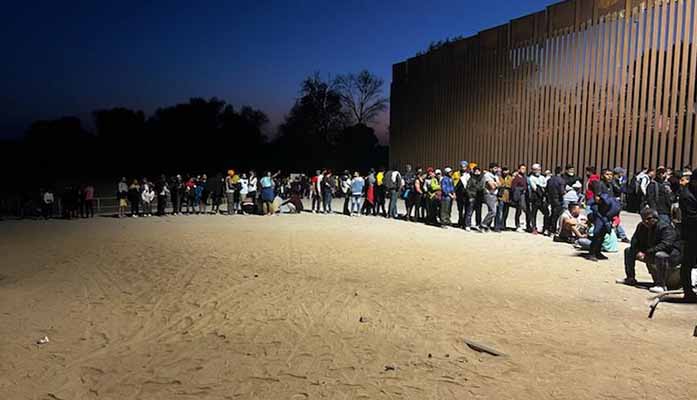
by Staff Reporter | Jan 5, 2026 | Education, News
By Staff Reporter |
Flagstaff and Coconino County officials plan to spend thousands to pay for a new annual gala by Northern Arizona University (NAU) celebrating diversity and Martin Luther King Jr.
The Coconino County Board of Supervisors approved the expenditure of nearly $9,000 from its Community Initiative Funds for NAU’s first annual Martin Luther King Jr. Gala during their regular meeting earlier this month.
Coconino County funds will pay $4,000 for rental of the host venue, $1,325 for audio-visual services and related costs, $650 for an IT specialist to manage the audio-visual services, $2,610 for staffing charges for venue set up and tear down, and $124 for room rental tax and associated sales taxes.
The gala plans to prioritize diversity and inclusion throughout its guest list and unique opportunities provided to attendees. It will focus on “promoting Black/African American culture and traditions through educational, historical, and performing arts events.”
In addition to elected and appointed leaders with both the city of Flagstaff and Coconino County, gala attendees will consist of select leaders within Flagstaff and Coconino County’s commercial, industrial, and business sectors, and NAU students, staff, educators, and administrators.
At the gala, the organizers will recognize “local leaders who embody Dr. King’s legacy as a ‘drum major for peace.’”
Flagstaff City Council plans to vote on an expenditure of $1,000 from the present total of $11,200 within the Council Initiative Fund during their regular council meeting next week. That agenda item also left room for further consideration of “any other programs” the council may want to subsidize using the Council Initiative Fund, which maintains $25,000 annually.
The city council established that fund as part of its fiscal year 2020-2021 budget.
The Martin Luther King Jr. Gala will take place on Jan. 17, 2026 at NAU’s High Country Conference Center. NAU’s Center for Inclusive Excellence and Access planned the gala.
A similar event last year hosted by NAU’s Black Student Union, which partly inspired this year’s gala, featured Coral Evans as the keynote speaker: the former Flagstaff Mayor and Senator Mark Kelly’s current Northern Arizona director.
Evans is the sister of the Center for Inclusive Excellence and Access program director, Dr. Rev. Bernadine Lewis.
Lewis told the Arizona Daily Sun that the event is meant to bring communities together across the city and county.
“Our focus is on economic development, workplace development and just community wellbeing,” said Lewis. “That is everything the center stands for and it is also everything that Dr. King stood for, fought for and died for.”
Details of the event have not been available on NAU’s Events page or elsewhere that AZ Free News could discover. The Center for Inclusive Excellence and Access did not respond to our questions about the event as of this report.
NAU is also hosting another, separate event to celebrate MLK Jr.: MLK Day ‘26.
This MLK Jr. celebration marks one of the top expenditures Coconino County made with its Community Initiative Funds, and one of the lowest expenditures Flagstaff made with its Council Initiative Fund from this past year.
AZ Free News is your #1 source for Arizona news and politics. You can send us news tips using this link.

by Ethan Faverino | Jan 5, 2026 | News
By Ethan Faverino |
The U.S. Department of Homeland Security (DHS) and U.S. Immigration and Customs Enforcement (ICE) remain steadfast in their core responsibility to defend American communities by apprehending and removing dangerous criminal offenders, even as political leaders intensify efforts to undermine these essential law enforcement operations.
In a recent action, DHS and ICE arrested Anel Billy Irigoyen Portillo, a criminal illegal alien from Mexico previously convicted in the United States District Court for the District of Arizona for importing fentanyl—a deadly narcotic that has ravaged families, fueled widespread addiction, and claimed countless lives across Arizona and the nation.
Portillo’s arrest is in line with the focus of DHS and ICE to target narcotics traffickers and other violent offenders who pose direct threats to public safety.
“While federal agents conduct lawful operations to protect public safety, newly elected Congresswoman Adelita Grijalva has chosen to publicly attack DHS and ICE, portraying enforcement actions as misconduct rather than acknowledging the clear and documented threat posed by violent criminal offenders,” said Representative John Gillette (R-LD30). “This rhetoric undermines law enforcement, encourages resistance to lawful authority, and erodes respect for the rule of law at a time when clarity and cooperation are essential.”
In a press release, Gillette called on officials in Pima County to prioritize full cooperation with DHS and ICE, rather than engaging in obstruction, delays, or politicalization of federal efforts. He urged the following actions to ensure the protection of Arizona communities:
- Complete cooperation between Pima County and federal law enforcement.
- Effective operational coordination with DHS and ICE.
- Termination of political attacks that disrupt lawful enforcement activities.
“DHS and ICE are doing the job the American people expect—removing violent criminals and drug traffickers from our communities,” Representative Gillette added. “Arizona does not need political grandstanding that shields offenders and targets law enforcement. The public wants dangerous individuals removed, and they want their elected officials supporting—not sabotaging—the mission. This issue is not ideological. It is about public safety, the rule of law, and standing with the men and women charged with protecting our communities and our country.”
Ethan Faverino is a reporter for AZ Free News. You can send him news tips using this link.

by Ethan Faverino | Jan 5, 2026 | Economy, News
By Ethan Faverino |
The Industrial Commission of Arizona announced the state’s minimum wage has increased to $15.15 per hour effective January 1, 2026, up from the current minimum wage of $14.70.
This $0.45 adjustment, mandated under A.R.S. § 23-363(B) and the Fair Wages and Healthy Families Act, reflects the rise in inflation from August 2024 to August 2025. The change highlights Arizona’s commitment to tying wage growth to economic realities, ensuring minimum-wage earners can better keep pace with living costs.
Certain exemptions apply under the Act, including employees of parents or siblings, casual babysitters in an employer’s home, workers for the State of Arizona or the U.S. government, and small businesses grossing less than $500,000 annually if exempt under federal law.
For tipped employees, employers may pay up to $3.00 below the minimum wage, provided they maintain records demonstrating that the employee’s combined wages and tips meet or exceed the minimum wage for all hours worked. This move aligns with a broader national trend where more than half of U.S. states now exceed the federal minimum wage of $7.25 per hour, unchanged since July 24, 2009—the longest period without an update since its inception in 1938.
Over the past decade, 30 states and Washington, D.C., have raised their minimum wages above the federal level. This momentum, driven by labor advocates and shifts in economic policy, recognizes that $7.25 is insufficient for a basic standard of living in most areas.
In 2026 alone, 23 jurisdictions—including 22 states and Washington, D.C.—have implemented or announced increases, reflecting a growing consensus on wage equity.
Arizona’s new rate of $15.15 positions it among 18 states where the minimum wage now tops $15 per hour. Washington, D.C., leads the nation with a minimum wage of $17.95 per hour, followed by Washington State ($17.13), New York ($17), Connecticut ($16.94), California ($16.90), Hawaii ($16), and Rhode Island ($16).
Ethan Faverino is a reporter for AZ Free News. You can send him news tips using this link.

by Staff Reporter | Jan 4, 2026 | News
By Staff Reporter |
Corporate media is making the case that the state’s largest sheriff’s office still needs federal oversight for racial profiling.
ABC 15 aired a segment criticizing a court filing requesting an end to the decade-long federal oversight of the Maricopa County Sheriff’s Office (MCSO). The oversight emerged from the Melendres v. Arpaio case, a class action complaint against allegedly racially motivated detentions that occurred during illegal migrant sweeps.
FOIAzona caught reporting errors made within a report by ABC 15 that no longer appears to be published, including the claim that MCSO filed the court motion.
However, it was the Maricopa County Board of Supervisors (MCBOS) who submitted that court filing earlier this month. MCBOS has budgetary power over MCSO.
In their court filing, MCBOS made the case that MCSO had long ago achieved 100 percent compliance in remedying issues of racially motivated detentions. The county argued that further federal oversight would only divert critical funds for public safety.
In a video explaining the filing, MCBOS Chairman Thomas Galvin said the end to federal oversight was long overdue.
“After 14 years, four sheriffs, and hundreds of millions of spent tax dollars, it is essential to defend taxpayer money if federal oversight is no longer warranted,” said Galvin. “All that’s left to enforce are matters unrelated to discriminatory policing which should be left to the sheriff who was elected by you: the Maricopa County residents.”
The 14 years of oversight have cost the county over $300 million in compliance. Around ten percent of those payments went to the court monitor, Robert Warshaw.
Leading up to MCBOS filing were months of allegations that Warshaw has a financial incentive to continue federal oversight of MCSO. Warshaw has earned over $30 million in monitor fees since taking on oversight of MCSO in January 2014 — around $3 million annually.
Warshaw faces similar accusations of exploiting federal oversight orders for personal gain in connection to his 15-plus years of monitoring the Oakland Police Department in California. There he earns over $1 million annually.
Warshaw has also earned millions from federal monitor assignments in New York, Michigan, and Louisiana.
Warshaw formerly served as the deputy drug czar for the White House Office of National Drug Control Policy under former President Bill Clinton.
Almost a decade ago, Judicial Watch reported on allegations that Warshaw allegedly employed “harsh” tactics that distracted from the county’s law enforcement activities.
Maricopa County Attorney Rachel Mitchell said Warshaw’s presence is no longer warranted.
“There is no defense for this ‘federal monitor,’” said Mitchell. “One more reason I like to get my news from the non-fiction section.”
Mitchell has been a vocal critic of Warshaw’s continued presence.
“It’s time we stop talking about Joe Arpaio — he is long gone and has been replaced by 3 different sheriffs from both political parties — and start talking about why the federal monitor, Robert Warshaw, is dragging this on and on,” said Mitchell in a May post. “Maricopa taxpayers should be outraged that we are at $350 million. Warshaw has no incentive to wrap this up.”
Back in October, Congressman Andy Biggs also asked Attorney General Pam Bondi to lift MCSO’s federal oversight. Supervisors Mark Stewart and Debbie Lesko, along with Mitchell, offered their support for the letter.
AZ Free News is your #1 source for Arizona news and politics. You can send us news tips using this link.

by Ethan Faverino | Jan 4, 2026 | News
By Ethan Faverino |
U.S. Representatives Paul Gosar (R-AZ-09) and Eli Crane (R-AZ-02) have reintroduced H.R. 6374, landmark legislation that would impose a complete 10-year moratorium on all immigration into the United States.
The bill, titled simply as a measure “to prohibit the admission of aliens to the United States for 10 years, and for other purposes,” would halt all new admissions of foreign nationals beginning on the date of enactment and continuing for a full decade.
In a joint announcement, the Arizona lawmakers cited the ongoing border crisis, overwhelming immigration systems, national-security vulnerabilities, and recent deadly incidents involving individuals who entered the country under prior policies as urgent reasons for the drastic pause.
Rep. Gosar issued the following statement:
“[The] tragic shooting of two National Guard members in Washington, D.C., within a few feet of the White House on Thanksgiving eve by Afghan national Rahmanullah Lakanwal is a sad reminder of Joe Biden’s reckless and unchecked open-border policies. Our immigration system is overwhelmed and unmanageable, thanks in large part to the previous administration’s open border policies, poorly vetted asylum claims, and visa overstays. We cannot maintain a lawful immigration process when we cannot control our borders or account for who is entering our country.
Fraudulent asylum claims, illicit trafficking, and insufficient vetting present real threats to our national security, our economy, and our citizens. Adversaries are exploiting these failures. Americans are being murdered. Meanwhile, schools, hospitals, law enforcement, and local governments—especially in border states like Arizona—are stretched to their limits.
Immigration must be legal, orderly, and in the national interest. Every nation has the right and responsibility to secure its borders and protect its people. I’m proud to join my friend and colleague Representative Eli Crane in reintroducing this legislation, which imposes a 10-year moratorium on all immigration until our system is restored, our borders are secured, and future immigration can occur safely and in a way that strengthens our country.”
Rep. Crane added:
“One of our most important responsibilities as representatives is to protect the citizens of our great nation. Due to the premeditated border invasion under the Biden administration, Americans have faced devastating consequences. I’m proud to join Rep. Paul Gosar in introducing this sensible legislation to restore stability and help reestablish security within our borders.”
The legislation is straightforward: for ten years following enactment, no alien may be admitted to the United States under any category or program. Supporters argue the pause is necessary to allow Congress and federal agencies to fix vetting procedures, close legal loopholes, deport criminal aliens, and restore operational control of the southern and northern borders.
Ethan Faverino is a reporter for AZ Free News. You can send him news tips using this link.

by Jonathan Eberle | Jan 4, 2026 | Education, News
By Jonathan Eberle |
State Representative Selina Bliss (R-LD1) has introduced legislation aimed at improving how schools respond to life-threatening medical emergencies by expanding access to advanced trauma care training for school staff.
House Bill 2076, titled the FASTER Saves Lives Act, would allow public school districts and charter schools to offer specialized emergency medical training to designated employees. The goal is to ensure that trained personnel are available on campus to provide immediate care in critical situations before professional first responders arrive.
Under the proposal, participation would be voluntary for both schools and individual employees. The training authorized by the bill includes hemorrhage control using tourniquets, airway management, stabilization of chest injuries, and coordination with law enforcement and emergency medical services. Training standards would be aligned with established civilian and tactical emergency medical protocols and would require periodic recertification to maintain readiness.
“Uncontrolled bleeding is a leading cause of preventable death after traumatic injury,” Bliss said in announcing the legislation. “HB 2076 gives schools the option to prepare staff to act immediately when an emergency occurs.”
Advocates for the measure note that schools often face inherent delays during emergencies due to large campus sizes, restricted access points, or distance from trauma centers. Studies from both military and civilian trauma settings show that survival rates decline rapidly when hemorrhage control is delayed, yet most school personnel receive only basic first aid instruction that does not address severe traumatic injuries.
“Whether the emergency is an act of violence, a serious athletic injury, or a transportation accident, trained responders on site save lives,” Bliss said. The legislation also addresses cost concerns. Training expenses are expected to be limited and could be covered through existing school safety grants, federal emergency preparedness funds, or private partnerships. The bill does not impose unfunded mandates on participating schools.
HB 2076 is scheduled for committee review, where lawmakers will consider its potential impact on school safety, liability protections, and implementation. If approved, the measure would give Arizona schools an additional, optional tool to improve emergency response and potentially save lives during critical incidents.
Jonathan Eberle is a reporter for AZ Free News. You can send him news tips using this link.






